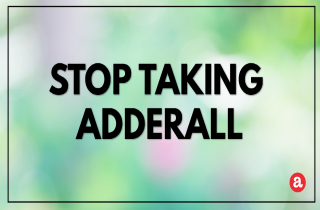ARTICLE SUMMARY: The safest way to stop taking Adderall is by tapering with the supervision of a medical professional. In fact, specific detox protocols can help minimize withdrawal symptoms. Sometimes medical detox or a stay in rehab is necessary.
TABLE OF CONTENTS
- What Happens When You Stop
- Can I Just Stop?
- Withdrawal
- Abrupt Cessation
- Medical Detox
- The Safe Way to Stop
- Tapering
- What’s Next?
- When to Call a Professional
- Do I Have a Problem?
- Is Rehab for Me?
- Ask a Question
What Happens When You Stop
After taking Adderall daily for a few weeks or more, the central nervous system must adapt. In fact, you can become dependent on Adderall after regular dosing, making it hard to quit without experiencing debilitating side effects.
When you have been taking Adderall in high doses or for long periods of time, your body becomes used to functioning with the drug in your system. In order to compensate for the stimulant properties of amphetamine and dextroamphetamine, your brain “slows down” some body processes in order to maintain homeostasis. It needs to adapt in order to operate.
So, when you stop the intake of Adderall, your brain is still operating in its “adjusted mode”. You will experience a variety of withdrawal symptoms as your brain returns to a “normal”, chemical-free state. Note here that a physical dependence on Adderall will simply involve unpleasant physical symptoms, but an addiction will cause you to experience painful cravings for Adderall as well.
Can I Just Stop?
No, it’s not a good idea to quit taking Adderall without medical consultation. Why?
Adderall is made of amphetamine salts. This psychoactive medicine stimulates the central nervous system and paradoxically calms the brain when it’s used to treat attention deficit hyperactivity disorder (ADHD). However, regular dosing can lead to drug dependence…even if you’re taking it as prescribed.
It’s just not a good idea to quit suddenly or abruptly. Adderall causes strong withdrawal symptoms, so you may end up taking it again in order to alleviate the discomfort. Plus, addictive is fairly Adderall? Very. In fact, the FDA approved label for Adderall warns:
Amphetamines have a high potential for abuse. Administration of amphetamines for prolonged periods of time may lead to drug dependence.
If you have an Adderall addiction, just stopping the drug doesn’t address the underlying psychological reasons you feel compelled to seek out the drug. While some people may be able to quit through sheer force of will, quitting Adderall all at once is difficult and not possible for everyone.
Withdrawal
Most people will develop a physical dependence on Adderall after taking amphetamine and dextroamphetamine for about 2-3 weeks on a daily basis. Stopping Adderall can cause a number of severe withdrawal effects, as your brain responds to the lack of stimulating chemicals. The symptoms are varied and can include:
- Abnormal lack of energy
- Anhedonia (the inability to feel pleasure)
- Brain fog
- Catnapping
- Cravings
- Depression
- Disorientation
- Exhaustion
- Fatigue
- Irritability
- Sleep disorders
Withdrawal effects may be worse if you’ve taken Adderall over long periods. For instance, if you take the medicine over the course of several years as part of a treatment for ADHD. If you want to learn when withdrawal symptoms occur in the timeline of withdrawal, this visual presentation may help you.
Abrupt Cessation
If you stop taking Adderall suddenly, you’re probably going to feel miserable. Adderall should always be gradually tapered, instead, to avoid the worst of the withdrawal effects. When you stop taking Adderall suddenly, it makes it more likely you will relapse, since you may be tempted to take it again to help alleviate the symptoms of withdrawal.
NOTE HERE: Quitting any stimulant drug can cause suicidal thinking, paranoia, or manic states. This is why medical supervision is critical any time you want to quit a drug like Adderall.
Stopping cold turkey isn’t easy and is not the best option for many people, especially people who are taking Adderall under a doctor’s direction. However, if you abuse Adderall recreationally, you may find it impossible to gradually reduce the amounts you’re taking. You might also experience serious adverse effects and need to quit Adderall immediately for health reasons.
If you decide to quit Adderall cold turkey and are dealing with addiction, you need to see a therapist or doctor to discuss treatment options. Getting help for your possible addiction is the best way to make sure you can quit any drug for good.
Medical Detox
Some people can benefit from checking in to an inpatient detox clinic as they get off Adderall. Medical detox centers offer symptom-based treatments, emotional support, and psychological support. Staff can guide you through dealing with early cravings, sleeping problems, and fatigue…three hallmark symptoms of withdrawal. Furthermore, you can benefit from 24-7 medical supervision, especially helpful in cases of psychosis.
Here are the following steps you can expect in a medical detox:
Step 1: Assessment.
The first thing that you will do in detox is completion of paperwork. You can also expect to participate in an hour of discussion. Also, you may be asked to give a sample for a drug test. This first assessment helps professionals create the services for your individual care.
Step 2: Clinical Assessment.
The second step is your clinical assessment. You will talk with detox supervisors. Trained staff will take your medical history, complete an evaluation, and conduct a physical examination. Moreover, nurses will obtain prescriptions in case of the need for antidepressants or anti-psychotic medications is required.
Step 3: Tapering.
Tapering schedules set the time period for reduction of dosages. These protocols are started based on doctor’s orders.
Step 4: Transition.
The last step of medical detox is transition to additional medical treatment. If you can benefit from rehab, a detox clinic can refer you to partnering programs. These programs will help you learn to live without drugs, and will help you prevent relapse. However, no one can make you continue with treatment. You have to want to enroll yourself.
The Safe Way to Stop
The safest way to stop taking Adderall is by consulting a doctor and following his or her instructions. Tapering is critical. In fact, this 2010 article “Potential adverse effects of discontinuing psychotropic drugs” reports the importance of tapering stimulant medications; it can truly avoid or minimize the potential withdrawal symptoms.
In sum, the safest way to quit amphetamines is to slowly reduce the daily dose over the course of several weeks. But, you may also need psychological support to stop taking this medication.
The course of a tapering schedule and its length depends on a person’s individual response to dosage reduction.
Tapering
Tapering is the medical term for gradually reducing your daily dose of a medicine over the course of several weeks. The tapering period lasts until the user has stopped taking the medication completely. How long does it take?
According to this study made by The U.S Department of Health and Human Services (HHS) gradual decreasing the daily dose by 0.05 mg every 3-4 days is recommended to stop Adderall safely.
The practice of slow reduction of daily dosage over a scheduled period of time should be custom-made or individualized for you. In fact, most tapering schedules are individualized depending on the level of drug dependence and a patient’s general health. This means that one tapering schedule may be good for one individual, but may not work for other. A doctor will be able to help you develop a plan which will be safe and minimize your discomfort as your body adjusts.
What’s Next?
STEP 1: Admit you need help. The first step to getting off Adderall is to accept the fact that you can’t do it alone. Get honest with yourself. If you admit your problem and ask for professional help, you’ll be able to resolve the issue quickly and safely.
STEP 2: Identify the main reasons to change. Second, find the motivation for change. Quitting Adderall does not happen overnight. So, you’ll need to return to your reasons for quitting again and again. Write them down and share them with your doctor.
STEP 3: Ask for help. Drug dependence is managed medically, so don’t wait for things to get worse, seek help. There are numerous people who can help you. Who can you ask?
- Addiction rehabs
- Psychologists
- Psychiatrist
- Detox clinics
- Doctors
- Pharmacists
When to Call a Professional
Always call your doctor when you want to quit Adderall because s/he is the one who prescribed the medication. Together, you can plan an individualized tapering schedule.
Also know that Adderall has addictive potential. So, call a medical professional anytime you think you may have a problem.
Are you alone in this?
Not at all! The National Survey on Drug Use and Health reported that in 2016, an estimated 540,000 people aged 12 or older had a stimulant use disorder in the past year. The division into age group is:
- aged 12 to 17 56,000 adolescents.
- aged 18 to 25 170,000 young adults.
- aged 26 or older 315,000 adults.
Moreover, a 2012 study published in the Journal of American College health states that two-thirds of college students were offered Adderall and other Rx stimulants by their senior year.
According to data from the Drug Abuse Warning Network (DAWN), the number of emergency department (ED) visits related to nonmedical use of CNS stimulants, including Adderall, among adults aged 18 to 34 increased from 5,605 in 2005 to 22,949 in 2011.
So, Adderall is not as safe as you might think.
Do I Have a Problem?
If you are not sure if you have a drug problem, or not, be honest about your use:
- Do you get a euphoric feeling from Adderall?
- Do you think about Adderall all the time?
- Is it becoming difficult to hide your use?
- Is Adderall use negatively affecting your life?
Did you answered more questions with ‘YES’? Then, you may have a problem, and it’s about time to call a professional. Also, check out this Drug Screening Tool by NIDA to assess a potential substance abuse problem.
Is Rehab for Me?
A rehab stay can help deal with chronic use or misuse. Staff will help you identify the main reasons why you have become addicted in the first place. But, the most important thing is that you will learn how to live without Adderall.
What options are out there? You’ll need to decide what kind of program will you enroll into: inpatient or outpatient.
On the one hand, residential inpatient rehab provides 24/7 medical supervision. During your stay, you will live at the facility where constant care is provided. The most common inpatient services include:
- Individual and group therapy sessions
- Educational classes
- Community support
On the other hand, outpatient rehab provides similar services, but patients don’t live at the facility. They come for a few hours, several days per week. During these visitation hours, an addiction counselor check up with the patients, and leads the therapies. This program is more flexible since it allows patients continue with their daily obligations.
Q: So, is rehab for you?
A: Ask for an addiction assessment. The results will help you determine what kind of treatment (if any) is needed.
Ask a Question
Do you still have questions about taking Adderall? Please leave your questions below in the comments section below. We are happy to help answer your questions, or refer you to someone who can.










Related Posts